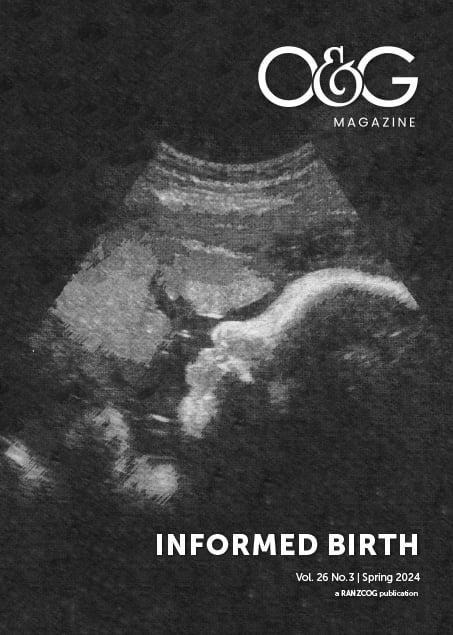Informed birthing and shared-decision making are vital components of maternity care, shown to significantly improve outcomes for women. However, a landmark parliamentary inquiry earlier this year in Australia revealed that birth trauma remains widespread and pervasive.1
Improving birthing experiences will require a sustained, collective effort from medical professionals, health practitioners, policymakers, funders, and administrators. This edition of O&G Magazine, which spotlights Informed Birth, is a testament to RANZCOG’s ongoing commitment to this essential aspect of maternity care.
Response to the NSW Select Committee on Birth Trauma
In response to the report of the New South Wales Select Committee on Birth Trauma, the College issued a comprehensive statement and has sought a meeting with the Hon. Ryan Park, New South Wales Minister for Health, to provide RANZCOG’s input to the recommendations. Additionally, the College has also convened a working group actively collaborating with Birth Trauma Association and the Australian College of Midwives to develop trauma-informed education for all multi-disciplinary providers of maternity care.
The College has achieved significant advocacy milestones in recent months as we continue to advance women’s health across Australia and Aotearoa New Zealand.
Addressing persistent pelvic pain
Persistent pelvic pain affects up to 24% of women worldwide, significantly impacting their physical health, emotional wellbeing, and overall quality of life.2 In Australia, the existing Medicare Benefits Schedule (MBS) doesn’t cover longer consultations required to investigate pelvic pain, often leading to challenges with treatment. To address this, RANZCOG worked with the Department of Health and Aged Care, highlighting the inadequacies, and making recommendations to reform the existing structure.
As a result, two new items will be added to the MBS from July 2025 to help patients access improved care, requiring an investment of $49.1 million. These new items will offer a higher fee for longer initial and subsequent consultations for complex gynaecological conditions, and a new extended 60-minute MBS item is also being introduced for GPs, which will ensure they are fairly compensated for the additional time required to examine patient’s histories and symptoms.
In addition, RANZCOG recently made a submission to the Victorian Inquiry into Women’s Pain – a critical initiative aimed at amplifying the voices of girls and women living with pain. The submission addressed the issue of persistent pelvic pain often being misattributed solely to gynaecological causes due to medical gender bias, leading to delayed diagnosis and treatment. RANZCOG called for systemic change and education to eliminate bias, while also promoting multidisciplinary approaches to pain management, and ensuring timely, compassionate, and comprehensive care for women.
Pelvic floor health campaign
In Aotearoa New Zealand, RANZCOG undertook public awareness activities that coincided with World Continence Week. Media and social media activities supported the work of Continence New Zealand and a RANZCOG webpage was launched with resources including media materials, case studies and the content developed for our advocacy work for clinicians and the public. Public promotion of pelvic health messages will continue on social media through the remainder of the year and RANZCOG is working closely with Te Whatu Ora Health New Zealand, the New Zealand College of Midwives and Physiotherapy New Zealand on education, assessment and treatment of the pelvic floor during pregnancy.
Enhancing the rural workforce
RANZCOG’s Rural, Regional, and Remote Women’s Health Strategy, introduced at the 2024 Regional Symposium, is focused on addressing the unique challenges faced by both rural practitioners, and women accessing services in underserved communities. The strategy seeks to enhance services in rural, regional and remote areas by tackling workforce shortages, expanding training opportunities and improving service delivery.
With the strategy still in the early phases of implementation, RANZCOG has already been advocating for workforce reform, providing key evidence to the NSW Legislative Assembly’s Select Committee on Rural, Regional, and Remote Care, and by participating in the Department of Health and Aged Care’s Medical Workforce Advisory Collaboration (MWAC). These efforts are expected to make a difference by improving access to comprehensive care in rural areas, fostering a more sustainable workforce, and enhancing health outcomes across these communities.
Maintaining a role in Specialist International Medical Graduates (SIMG) assessment
RANZCOG is focusing on expediting pathways for Specialist International Medical Graduates (SIMG) and has highlighted the essential role of specialist colleges in assessing international registrants and supporting their integration into the Australian healthcare system.
In a submission to the Medical Board of Australia (MBA) and the Australian Health Practitioner Regulation Agency (AHPRA), RANZCOG emphasised that the continued involvement of specialist medical colleges is crucial for maintaining clinical excellence. This involvement also ensures that SIMGs are well prepared to meet Australia’s diverse medical and cultural needs, supporting the development of skilled professionals ready to contribute effectively.
In Aotearoa New Zealand, RANZCOG also responded to a proposal from the Medical Council of New Zealand to introduce an expedited pathway, along with several other proposed changes. The College’s role in SIMG assessment is more limited in New Zealand than in Australia, in that RANZCOG acts as an advisor to the Medical Council who makes decisions about registration, and it prescribes and manages supervision of SIMGs. As in Australia, RANZCOG’s focus in responding to consultation was on maintaining clinical standards while also supporting more efficient assessment and registration of SIMGs, who are a vital part of Aotearoa New Zealand’s O&G workforce.
RANZCOG Roundtable on Improving Access to Medications & Devices in Pregnancy and Women’s Health
In May, RANZCOG held a roundtable in response to medicines and devices commonly used in pregnancy and women’s health being unavailable in the Australian market or in critical short supply with potentially serious implications for the day-to-day care of patients. The RANZCOG Roundtable on Improving Access to Medications & Devices in Pregnancy and Women’s Health, convened key stakeholders to workshop solutions for improving medication and device supply and use, with the objective of bettering health outcomes for women and supporting College members and trainees’ ability to deliver safe care.
Private Practice Roundtable
In November, RANZCOG’s Private Practice Committee will convene a Roundtable, which will bring together stakeholders including College members, the Australian Department of Health and Aged Care MBS Members Services, and private health insurers to consider current challenges, and ensure a sustainable future for private
O&G practice in Australia.
A personal thank you to our members
Volunteer members play a crucial role in the College’s advocacy efforts by dedicating their time and expertise to submissions, meetings, workshops, consultations, and developing practical solutions. Their invaluable contributions help address challenges and disparities in our healthcare system, driving forwards excellence and equity in women’s health. Looking ahead, RANZCOG remains dedicated to advocating on issues affecting members, trainees, and the broader women’s health community.
I hope you enjoy this edition of O&G Magazine and thank you for your continued interest in the College.
References
- Report of the New South Wales Select Committee on Birth Trauma [internet]: Report (nsw.gov.au)
- Victorian Department of Health [internet]: Inquiry into Women’s Pain (health.vic.gov.au)






Leave a Reply